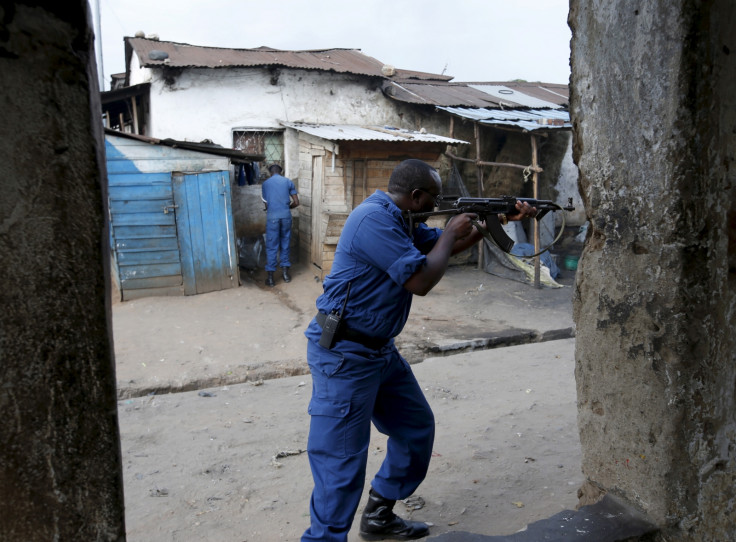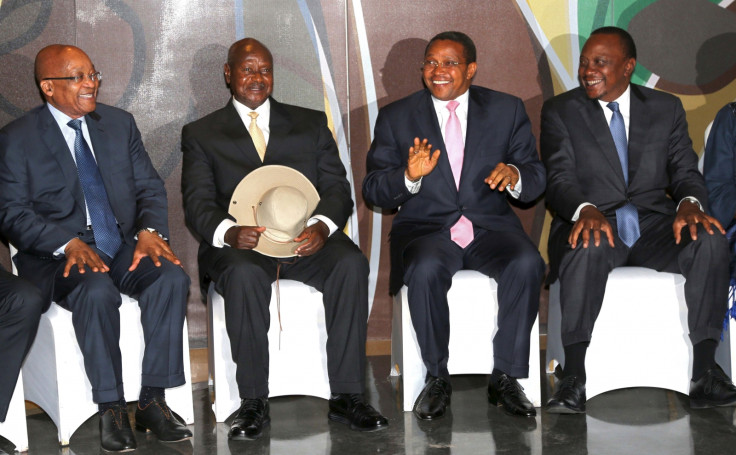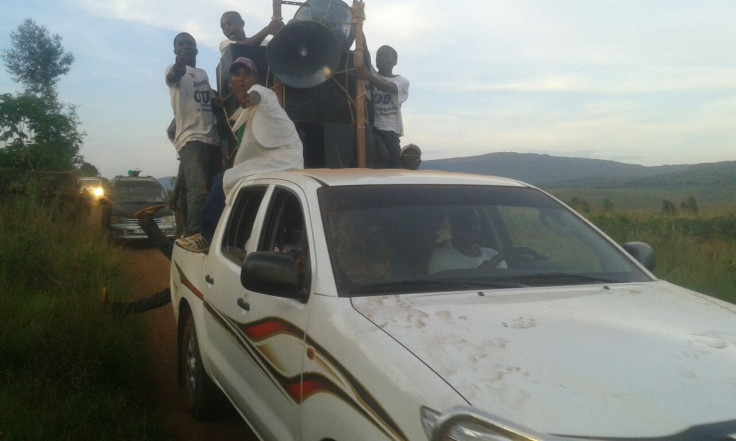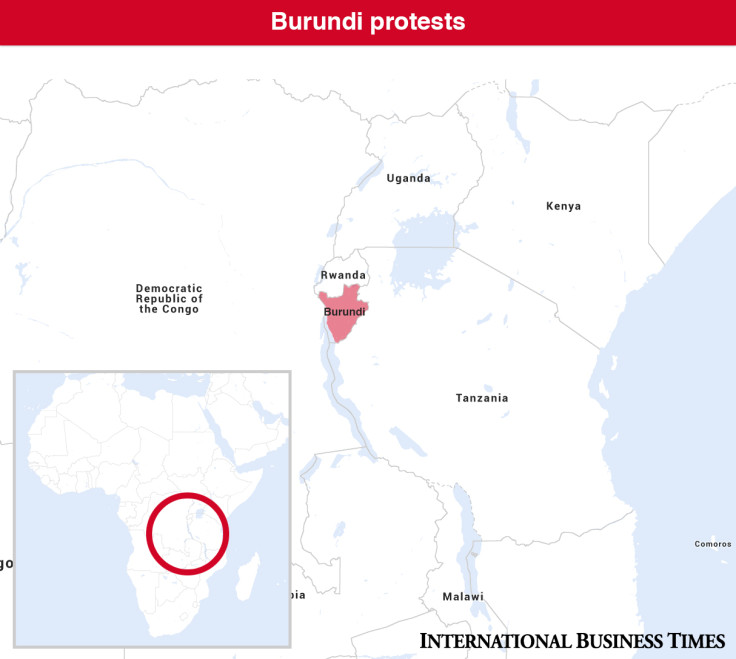Burundi violence: Protesters truce after 'disappointing' EAC election crisis meeting in Tanzania

Opposition leaders have called for a truce on Monday (1 June) following a crisis summit in Dar Es Salaam, Tanzania, about the ongoing violence in Burundi after leaders of the East African Community (EAC) called for a delay of contested Burundian elections.
On 28 May, leaders of the opposition announced a boycott of the controversial legislative and municipal elections on 5 June and presidential elections on 26 June. The boycott follows over a month of street violence, which have left more than 30 people dead and over 500 injured since 26 April, when Burundi's ruling party National Council for the Defense of Democracy (CNDD-FDD) nominated President Pierre Nkurunziza to stand for re-election.
Opposition leaders want Nkurunziza to withdraw his third-term bid in the upcoming 26 June elections, claiming it violates the country's constitution and the Arusha Accords, a peace deal that ended an ethnic civil war in 2005.
Nkurunziza's supporters, however, argue that the president's first term should be discounted as he was chosen by the parliament and not by the people in an election as is specified in the agreement.
'Disappointing' EAC recommendations
During the meeting on Sunday (31 May), the East African leaders called on the government in Bujumbura to postpone elections by a period not less than a month and a half, demanded that "all parties stop violence and exercise restraint during this period", and ruled for an "urgent disarmament of all armed youth groups allied to political parties".
Nkurunziza's government on Monday said it accepted to postpone the presidential elections until 26 July.

For opposition leaders, who told IBTimes UK they had expected leaders to call for Nkrunziza to withdraw his candidacy and for the Imbonerakure (the extremist militia and youth wing of his ruling party CNDD-FDD) to be disarmed, the leaders' recommendations are disappointing.
"The postponement of a month and a half is good, but the reasons that are hindering proper elections haven't been treated with this time recommendation," Faustin Ndikumana, an anti-corruption activist and founder of the NGO Parcem, told IBTimes UK on Monday (1 June).
"The final recommendations don't have any constraining nature for the government and some words we wanted to see appear such as the Arusha Accords and the Constitution are absent. It shows a slackness from the [African] sub-region."
Frederic Banvuginyunvira, vice-president of the main opposition party, the Front for Democracy in Burundi (known by its French acronym Frodebu), told IBTimes UK that the recommendations "did not take into account the concerns of the protesters" about the President's third term.
This is why, he explained, the opposition had called for protesters to respect a 24 hours truce, "so we can decide what to do now that we know what the leaders' recommendations are".
Burundian president's notable absence
While President Yoweri Museveni of Uganda, President Uhuru Kenyatta of Kenya, and Jacob Zuma, president of South Africa met with Tanzania's leader Jakaya Kikwete, the Burundian president did not attend and was represented there by his foreign minister, Alain Nyamitwe – the presidential adviser Willy Nyamitwe's brother.
It was during a first crisis meeting on 13 May 2013 in Dar Es Salaam attended by Nkurunziza, that a top general launched an unsuccessful coup d'etat.
The EAC was traditionally made up of Kenya, Tanzania, and Uganda, but was expanded to include Burundi and Rwanda in 2009.
Paul Kagame, President of Rwanda, who is expected to seek a controversial third term in office after his supporters petitioned the country's parliament to remove a clause from the constitution limiting him to two terms, also failed to appear in Tanzania.
For Banvuginyunvira, these absences could translate a discomfort from both presidents regarding the question of a third mandate in power.
"The heads of state were afraid, they wanted to protect themselves, and would not address the third mandate, because the question of the third term is not just about Burundi but it is also about Rwanda and Uganda," Banvuginyunvira said.
No mention of extremist militia
While they welcomed the Summit's recommendation on the disarmament of Burundi's youth groups, members of the opposition slammed the lack of specificity of the proposals.

"The problem is that leaders have not pointed specifically to the Imbonerakure - they talked about youth groups affiliated to political parties very generally, as if the opposition also had similar groups – which is not the case," Ndikumana said from Bujumbura.
According to the activist, leaders should have addressed the strong presence of the Imbonerakure militia, which has been accused of being behind a campaign of intimidation that has led to the flight of over 72,000 Burundians to bordering countries.

Further, Ndikumana claims the EAC has failed to recommend that government forces, including the police, "avoid shooting directly at protesters or stop the judicial harassment of opponents linked to these manifestations".
"It was a vague recommendation that all parties must stop the violence," Ndikumana added.
US visa restrictions welcome
The US, however, has taken steps to impose visa restrictions against individuals responsible for inciting violence, including by those who support the actions of the Imbonerakure.
"We are deeply concerned that the recent grenade attacks, violence perpetrated by the ruling party Imbonerakure youth militia, and continued restrictions on peaceful assembly and the media are undermining efforts to achieve a peaceful resolution of the current crisis," Jeff Rathke, a US State Department spokesperson said on Friday (29 May).
Banvuginyunvira, who said he welcomed the US's decision to consider sanctions against those committing violence, warned that the protests would resume as soon as Tuesday morning, while economist Ndikumana said there may be a risk that the Burundian opposition could "take comfort in the summit's recommendations".
© Copyright IBTimes 2025. All rights reserved.





















